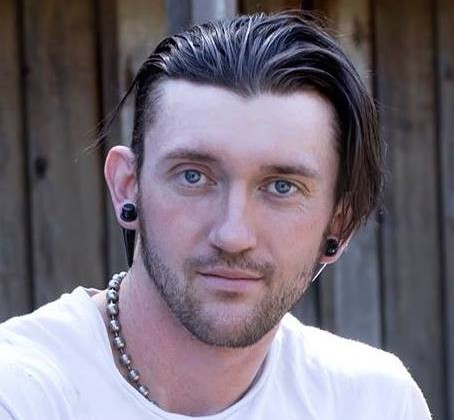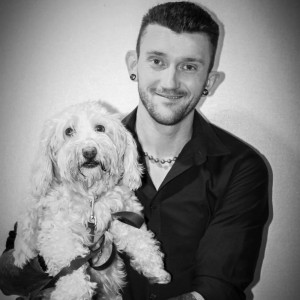
Undercover Investigator TJ Tumasse: “It is the responsibility of the consumer to know that they are directly supporting this suffering”
TJ Tumasse spent more than six years working as an undercover investigator inside many of the nation’s largest factory farms, local shelters, and roadside zoos for Mercy For Animals and other organizations. His cases exposed the ugly truth about what continues to happen behind closed doors, and led to groundbreaking criminal convictions for felony abuse to factory farm animals as well as corporate, local, and federal policy changes.
Now retired from undercover work, TJ is preparing to head up an all-new investigations department for the Animal Legal Defense Fund. We spoke with TJ about his career and the cases that have helped to affect change in the lives of animals across the United States.
Can you share your vegan story? What brought you to veganism?
I came to veganism after I lost someone close to me. I learned through the tragedy of that death that we as humans do not treat life with the respect that we should. I became vegetarian that day, out of respect for the loss I felt. A part of respecting life is that we must not justify suffering. I became vegetarian and then, after a few months, quickly became vegan after reading and understanding the philosophy of speciesism through the book Animal Liberation by Peter Singer. It was something I had to do and wanted to do, not out of ego but out of moral obligation to the principle that just because we can does not mean that we should. Compassion is never extreme.
What inspired you to become an undercover investigator? Going into it, what were your expectations about what it would be like, and how did that match up to the reality?
For some reason I felt that I was strong enough to work undercover. I was very wrong of course. I had to adapt and grow strong enough to cling to who I am. I thought I was prepared for it, for what I would have to see and do, and I was very shocked to find that the reality of being in that barn, or kill floor, was much worse than I ever could have imagined. I decided that the best way on earth to advocate for animals was to work undercover. I felt that I could not wait for someone else to do it. It was my responsibility to give them a voice. I was paying a debt. I look back at all those years now amazed that somehow I found the strength to continue to work and film. I put my emotional stability to the test, my body in peril of serious injury and exposure, and even my very life at risk, so that people could see the true cost of their food choices.
I am vividly aware of the end result of an investigation, i.e. watching the gruesome video of animals being terrorized and violated, sometimes watching rough cuts of the video, thanks to MFA. I know how difficult it is to watch the videos. What was it like for you to experience the nightmare in person?
The nightmare of factory farming is more than can be described in words. No one can see, smell, taste, hear, or feel that nightmare without going into that farm and actually doing it. There are not enough videos, photos, or stories in the world that can depict the hell in which animals live every minute of every day of their lives. What I saw working undercover will haunt me for the rest of my life.
How did you deal with your own emotional and physical pain of undercover work? Did you create healthy ways of processing what you were experiencing, or was there no time to do so while at work?
I used music to give me emotional support and reached out to close family and friends who could sympathize. You have to be a different version of yourself to work in those horrible places and watch animals suffering every day. You have to tell yourself that you are there for the greater good and that the animals have no one to speak for them if you are not there. So you swallow the emotion and you work through the physical pain so that the animals will have a voice.
How do you explain the abusive behaviors of your fellow workers? What do you make of their disconnection to these sentient individuals? Were you ever able to have conversations about the killing with co-workers at the farms?
The workers are in most cases people who have no other option in life and are working these jobs to provide for their family in a way that they could not without that job. They are forced by these companies to work so hard and fast that they hurt animals. There are a few truly sadistic people at these places who actually enjoy hurting animals, but they are less common. I think that people should be held accountable for their actions, but more than that people need to know that the company is only abusing animals because it is profitable. If we take away their profits and stop buying their products then the abuse will stop. That is why veganism is so important.
What do you say to people who say that the animals don’t have awareness, don’t have any idea that they are about to be killed, that they are basically automatons?
People who say that have obviously never been in a slaughterhouse at all. When you look into the eyes of an animal who is about to die, an animal who feels, and fears, and cries just like humans, you can see in them the same fear that you or I or anyone has for their own life. They fear for and fight for and suffer at the loss of their lives with protest and dignity. When I face the end of my life, I hope that I am able to remain half as strong as the animals I have seen dying. To deny them the ability to fear and feel is to grasp at the straws of speciesism of which there are fewer and fewer every day.
You spoke about holding the system responsible for the violence in food production, that rather than focusing so much on the workers and convictions, we need to focus on the consumers. Can you explain further?
The suffering of animals is systematic, and that system depends on one thing, profit. If it were not profitable to exploit animals companies would not do it. The reason it is profitable is that people pay these companies to give them these animal products at the lowest cost possible. The only way to do that is to exploit animals and humans in order to meet the demand. It is the direct responsibility of the consumer to know that they are directly supporting this suffering. Convicting persons who abuse animals will allow people to feel content with buying animal products because the “bad guy” hurting animals is no longer working at the farm or facility. This is counter-productive, we need to show people that the exploitation, rape, and murder of animals is systematic and inherently cruel. Their food choices directly cause immense suffering.
Many people watch videos from investigations and make the choice to no longer support that supplier or farm. You use the term “scapegoat.” What do you want the consumer to do when they see a video? How do you suggest we do a better job of conveying that all farms are unethical, be they factories or “family” farms? What specific tactics need to be employed to make this point to the public?
I think that people need to understand that all sentient beings have a right to their own lives. We need to show people that all animals fear and suffer just as we do. The fact that speciesism is now in the dictionary and is defined analogously to racism and sexism shows that the tide is turning and that although progress is slow more people are beginning to understand that concept. It does not matter how kindly we attempt to do it, taking their lives and using them against their will is oppression, and it is wrong. Veganism is the key in this process, and people like to call it extreme, but the reality is that being compassionate is never extreme.
Now that you are no longer doing undercover investigations, what are your plans for the future?
I hope to take my experiences and continue to tirelessly advocate for the lives of all sentient beings. I will never stop speaking on their behalf. I am a voice for the voiceless, and I always will be. I am currently working with Animal Legal Defense Fund to build and run a brand-new investigations department there. I will be working to teach new investigators what I know, and help them document cruelty and abuse, to continue to educate the public about the reality of the suffering of animals.
Comments
- “Consumo Dunque Decido” parla TJ Turmasse, attivista undercover americano | associazione d'idee onlus - […] la traduzione dell’intervista a TJ Tumasse pubblicata on line da Thinking Vegan il 17 Settembre […]
Leave a Reply
*

Chris Murphy
September 18, 2014
I admire your courage and fortitude. Cheers T.J.
Seba
September 27, 2014
Great interview! You are such an amazingly strong soul, TJ, and I am honored to know you. Thank you so very much for the work you’ve done, and continue to do, to expose the dire plight of animals who humans exploit for profit. The animals need your strength –
Stian Karlsen
October 13, 2014
Undercover work obviously requires immense strength and courage. My hat’s off to you, sir!
Angie
December 9, 2014
I have nothing but respect for you.